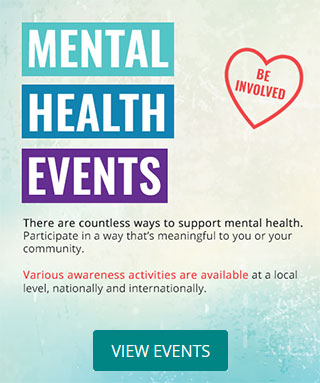Conditions & Treatment Options
Personality disorder

In this section the contents will primarily focus on borderline personality disorder (BPD), of which there are 6 types defined. Below we have detailed BPD information and many valuable resources. Visit the Australian BPD foundation for more resources.
for Consumers
01. A guide to accessing BPD services in Victoria.
02. A list of viable publications and books about BPD.
for Carers
01. When a family member or friend has BPD is a PDF brochure from Spectrum, personality disorder service for Victoria
02. BPD help tip for families and carers is a PDF offering strategies for families and carers relating to a person with BPD
03. What to do when someone you love has BPD is a family guide to validation.
Resources
01. Download our most useful scale resource pdf.
02. View our comprehensive list of categorised resources
What is a personality disorder?
There are a number of definitions of personality disorder. Most agree that personality disorders affect the way people think and feel about themselves and others. They may have difficulty in their relationships because of their sensitivity to particular kinds of interaction with others. For example, people with Borderline Personality Disorder (BPD) are very sensitive to feeling abandoned or rejected by other people, especially people they care about. When they feel hurt and/or rejected they often become deeply distressed and then have adverse thoughts and feelings about themselves. These in turn lead to deeper distress.
While many of us experience these feelings from time to time, the features that define a personality disorder are the intensity and frequency of the distressing thoughts and feelings the person experiences.
People with borderline personality disorder have these painful experiences to a significantly higher degree than the general population. This can cause serious and intense psychological pain, suffering and instability. Sometimes the distress associated with these feelings may cause the person to engage in self-harm or other harsh, risky and damaging activities to try and manage the intensity of their distress. Although these acts can give short-term relief from psychological pain, they do not offer lasting relief, which can best be provided by psychological interventions.
There are six types of personality disorder, each with its own particular characteristics. Each type is described on the home page of Spectrum’s Personality Disorder resource page.
This webpage will focus on Borderline Personality Disorder (BPD). The challenges people with BPD experience very often lead them to seek assistance from medical and mental health services. We would like to promote an understanding of some of these challenges and what can be done to help those experiencing them.
Borderline personality disorder
Frequently asked questions (FAQs)
What is a borderline personality disorder?
BPD is a mental illness that describes a certain set of behaviours (symptoms). A diagnosis of BPD is based on an assessment of these symptoms over time, and across a range of situations.
Experiences of BPD include:
Strong, overwhelming emotions and feelings
People with BPD frequently describe an overwhelming, almost constant, emotional pain. They experience extremely strong and changeable emotions. Many find it hard to self-soothe and have learned to cope by repressing many of their emotions; resulting in feelings of numbness, unreality and boredom. Some can feel angry a lot of the time. When present, the anger is compounded by their difficulties in regulating emotions, which are sometimes expressed in anger towards the self, sometimes to the extent of self-loathing, or self-hatred.
Difficulties in relationships
People with BPD can experience strong and changeable feelings of love and hate more frequently than others because of their heightened sensitivity to what they perceive as signs of rejection or criticism. This may be accompanied by a predisposition to distrust people (especially those in close relationships), and difficulty coping with losses and separations. Challenges with emotional attachment to others may develop, leading some people with BPD to become very dependent on another person or persons, while others respond by trying to avoid close relationships.
Impulsive, often self-destructive behaviour
As a response to, and, as one way to manage feeling emotionally overwhelmed people with BPD may engage in self-harm and/or in thoughts of suicide or suicidal attempts. Self-harm can bring some short-term relief. Unfortunately, adverse long-term consequences can also occur. In addition, people with BPD may use drugs or alcohol, binge eating, or problem gambling as a way to help them to manage their emotional distress.
Fragile sense of self
People with BPD frequently find it difficult to maintain a clear and stable sense of their personal identity, their values and ‘who’ they are especially during times of stress This refers to problems experiencing, identifying and maintaining a clear and stable sense of their own feelings and thoughts particularly when interpersonal problems arise. During times of stress some people with BPD may withdraw, leaving them feeling vulnerable and alone. At times like this, feeling threatened or becoming paranoid is common. This usually passes when the level of stress reduces.
Most of the above information is adapted from the website of Spectrum Personality Disorder Service in Victoria with their permission. More information is available on the Spectrum website.
If you find yourself relating to the difficulties described in the description of BPD and would like to know if you have BPD, you could read more about it on this website, see your GP, or ask your GP for referral to a mental health practitioner or clinic.
What treatments are available?
When someone with BPD feels in crisis and is finding it difficult to control suicidal impulses and any other self-harming behaviours, they need assistance to help regain a sense of safety. Helping someone develop ways to deal with frightening impulses and improve their ability to deal with the intense emotions present at stressful times is the first phase of treatment for BPD in many cases. Their GP may refer them to a psychiatrist or psychologist or ask them to go to the Emergency Department of a local hospital to access the help needed in a crisis situation. Phone services like Lifeline or one of the other services listed above can be very useful for help and advice at these times.
Is medication suitable for BPD?
Medication can be useful to treat symptoms of BPD at times but does not affect the underlying problems or causes. Ideally, medication should only be used in the short-term in order to prevent the side-effects, including weight gain, that can occur particularly with long-term medication use.
What are effective treatment options for BPD?
BPD responds well to psychological forms of treatment. This has been shown in research studies from all over the world and is the principal form of treatment recommended by all authorities in the field.
Most people with BPD want more than help at times of crisis for the difficulties they have. They want help to feel better about themselves and improve their relationships and their lives. What follows applies to psychological forms of treatment for BPD which are aimed at helping them to regulate intense emotions, manage impulses to actions that can be harmful (even though they might give relief at the time) and understand themselves better.
Many people can no longer be diagnosed with BPD within 2 years of presenting for treatment. The first symptoms to respond to treatment include things like self-harm, suicidal behaviours and angry outbursts. It can take longer for other symptoms to improve or remit, but it is clear that people with BPD who engage in psychological treatments usually do well over time.
Is psychotherapy available for BPD?
There are many forms of psychological treatment that are effective for people with BPD. They include treatments specifically developed for BPD, which include Dialectical Behaviour Therapy, Mentalization Based Treatment and Transference-focused Psychotherapy among others. However, these specific forms of psychotherapy are not always available or accessible, so it is important to know that treatments that include the factors common to the specific forms of treatment have been shown to be just as effective in research studies.
I am going to assume that you are reading this because you are someone with BPD interested in getting help for your difficulties and address you personally now.
Details of the factors common to effective treatment are listed in the section for clinicians if you are interested in looking at them, but in brief they are as follows:
- The treating clinician has a collaborative, cooperative way of working with you.
- They are interested in understanding you as a person and hearing what you have to say.
- They describe the treatment they are recommending clearly and explain why they recommend this particular treatment approach for you.
- You are given an opportunity to ask questions about the treatment and clarify anything that isn’t clear.
- The treatment has a clear framework, ie time, place, and duration of sessions.
- You will usually be asked to set goals for your treatment
- You are told what the clinician’s role is and what your role in the treatment will be.
- If a fee is involved, you know what it is.
- The focus will usually be on your feelings and thoughts about the people and events in your life. This focus can help you understand more about yourself and other people, which can help you to deal , over time, with upsetting events, especially those that occur in relationships.
Remember, the most important factor in the treatment of BPD is the quality of your relationship with the psychotherapist, psychiatrist, or other clinician treating you (I am going to refer to all these people as ‘therapists’ for short).
It is important that you feel safe enough in the relationship with your therapist to let them know when you disagree with what they say, or feel hurt by a remark they make. This will help them to understand you better, especially if you are able to explain the reason or reasons you disagree. Misunderstandings occur in all relationships, not just in treatment situations. Working with your therapist to repair them is important not just for the progress of the treatment, but also for making it easier for you to make sense of things that may go wrong in your relationships outside of therapy. Remember, in good-relationships people work together to try and understand each other and to repair things that have been misunderstood, or mistakes that have been made.
You might like to read more about BPD and treatment for it. A good book co-written by a psychiatrist and a person who has recovered from BPD is:
Borderline Personality Disorder: the facts by Roy Krawitz and Wendy Jackson, published by Oxford University Press in 2008.
What information is available for the family members & carers of someone with BPD?
It is often hard for partners, family members, friends and carers of someone with BPD to know what to do that is helpful for their family member. They can find it hard to understand the level of emotional pain and difficulty someone with BPD is experiencing. They may struggle to make sense of sudden changes in their attitude or emotional responses that occur. They may be scared that their friend or family member will die as a result of impulsive or suicidal actions or self-harming behaviour.
Sometimes they may get angry or critical of the person with BPD because they are so worried about them and want them to ‘snap out of it’. If the family member or friend expresses anger or criticism this may be perceived as control, judging, blaming or shaming and tends to increase the other person’s distress.
A frequent concern for family members is that they will be blamed by others, including mental health clinicians, as being responsible for their family member’s problems. Sadly, it is only recently that the mental health profession has recognized how stressful family members can find it living with someone they love who seems to have unexplained and excessive mood swings and is seems often to be extremely distressed or angry more than the situation seems to warrant. The reality is they don’t know how to help.
It is important to know that people with BPD are very sensitive to what happens between them and other people, particularly people they care about or feel close to. Abrupt changes in their attitude or behaviour towards another person almost always relates to something that has occurred in the interaction with them. The person with BPD may have misunderstood what has been said, or taken it as a criticism, even when it was not intended to be so. When this happens, it is important for family members to try and stay calm and validate the person’s emotions. When the person is calm again it may be helpful to try to discuss what circumstances led to such distress or anger. This may enable the person with BPD to recognize that you want to understand what has upset them. And that is a really important message for them to receive.
Help is available. The Spectrum website offers useful information and there are many other resource options listed in our resource section.
Resources
Spectrum website consumer information
If you suffer from BPD you might want to look at Spectrum’s website which has some very useful information: www.bpdfoundation.org.au
Spectrum’s website links that could be especially useful are:
Accessing treatment and services in Victoria
Australian treatment guidelines
Complex care services
Contact us
Crisis support
Developing a plan to help manage a crisis
Emergency support numbers
Features of effective therapy
Health professionals
How do you access treatment from Spectrum?
Outpatient treatment clinics
Phone support services
Referral process and forms
Resources and support
Secondary consultation
Strategies for coping with BPD
Support for families, friends and carers
Treatments available internationally
Websites, forums and apps
What else is there beyond treatment?
What is a personality disorder?
What kinds of treatments are available through Spectrum?
Individual sessions
Private individual sessions
- Private psychiatrist (doctors can prescribe medication www.ranzcp.org)
- Psychologist, registered with APS
- Psychotherapists, registered with PACFA
- Social workers www.aasw.asn.au
Websites and call centres
- Life Line 13 11 14 | www.lifeline.org.au
- Sane Helpline 1800 187 263 | www.sane.org
- Victorian Mental Illness Awareness Council 03 9380 3900 | www.vmiac.org.au
- Australian BPD Foundation www.bpdfoundation.org.au
- Spectrum BPD www.spectrumbpd.com.au
Community self-help, face to face and on-line group meetings
- Adult Children of Dysfunctional Families www.acoasydney.com.au
- Narcotics Anonymous www.na.org.au
- Debtors Anonymous www.debtorsanonymous.org.au
- Co-dependents Anonymous www.codependentsanonymous.org.au
- Sex and Love addiction Anonymous www.slaa.org.au
- Food addicts Anonymous www.foodaddicts.org
- Al-anonwww.al-anon.org.au
- Alcoholics anonymous www.aa.org.au
Family members and carers
Useful books for family members and carers are:
Overcoming Borderline Personality Disorder: A family guide for healing and change by Valerie Porr Oxford University Press, 2010.
The Essential Family Guide to Borderline Personality Disorder New Tools and Techniques to Stop Walking on Eggshells Randi Kreger 2008.
Stop Walking on Eggshells: Taking Your Life Back When Someone You Care About Has Borderline Personality Disorder Paul T. Mason and Randi Kreger.
These books help family members and friends to understand what is happening for their family member and teach concerned family members effective coping behaviours and interpersonal skills such as validation.
Other resources for family members and carers are as follows:
BPD Specific:
- Spectrum offers regular workshops and information sessions for carers throughout the year. Visit www.spectrumbpd.com.au or ring (03) 8833 3050
- What can carers and supporters do to help? www.spectrumbpd.com.au/resources-and-support/
- When a family member or friend has BPD – BPD brochure
- Australian BPD Foundation’s Help Tips for Families and Carers
- Victoria – Mind BPD family and friends support group – Contact the carer helpline on 1300 554 660 for more information
- Spectrum Personality Disorder Service for Victoria website
- Australian BPD Foundation website carer information
- Project Air Strategy for Personality Disorders
- NEA BPD (Aust) and the Family Connections Program – This is a free, 12-week course that meets weekly for two hours to provide education, skills training, and support for people who are in a relationship with someone who has BPD.
NOT specific for BPD:
- Mind Mental Health Carer Helpline 1300 554 660 (business hours)
- Carer Advisory Line – 1800 242 636 (not specific to Mental Health) 8.30 am – 5.00 pm Monday to Friday (except for public holidays)
- Sane online carer forum
- Carer support groups
With special thanks to
Many people have contributed to the development of this project through research, focus groups, advice, information and ideas. We would like to acknowledge and thank all who have contributed and supported us in our endeavor. They are:
A/Prof Josephine Beatson Senior Clinical Advisor
Rita Brown Carer Consultant
Phillipa Bradley and Haley Beckham
Newsletters
Stay in the loop with our monthly newsletters!
If you are having thoughts of suicide, or severe self-harm please follow your crisis plan. If you do not have a crisis plan please call your treating clinician, therapist, general practitioner, one of the numbers listed below or go to the Emergency Department of the nearest hospital. In a life-threatening emergency ring 000.
Phone numbers and other supports that can be contacted in a crisis:
Life Line: 13 11 14 | www.lifeline.org.au
Sane Helpline: 1800 187 263 | www.sane.org






 The 2014 Act came into effect in July 2014. It introduced new principles to support people experiencing mental illness to make and participate in treatment decision (shared decision making) and to have their views and preferences considered and respected.
The 2014 Act came into effect in July 2014. It introduced new principles to support people experiencing mental illness to make and participate in treatment decision (shared decision making) and to have their views and preferences considered and respected.

